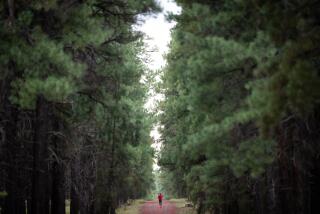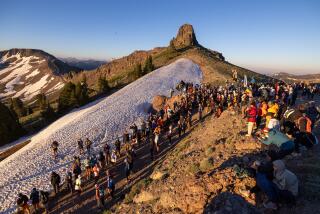Long-distance romance
Why? Why would a healthy, professionally successful, happily married father of two volunteer to run for 75 hours straight, putting one foot in front of the other, over and over and over again, for 262 miles?
Dean Karnazes, the extreme athlete who has probably run farther at a stretch than any primate, is the best known super-distance ultramarathon runner, a practitioner of a sport not known for creating stars. Having just written “Ultramarathon Man: Confessions of an All-Night Runner,” he is perfectly positioned to answer the single syllable question posed by most people who hear about the exploits he and his fanatical brethren undertake.
For the record:
12:00 a.m. April 13, 2005 For The Record
Los Angeles Times Wednesday April 13, 2005 Home Edition Main News Part A Page 2 National Desk 1 inches; 54 words Type of Material: Correction
Ultramarathon runners -- An article in Saturday’s Calendar section about Dean Karnazes, an ultramarathon runner who has just published a book, said Karnazes probably had run farther at a stretch than any primate. Karnazes’ longest run was 262 miles; on March 25, Tucson long-distance runner Pam Reed finished a run of 301 continuous miles.
Why would he become one of six adventurers to run in the first marathon to the South Pole? Why would he complete the punishing, 135-mile Kiehl’s Badwater race that cuts across Death Valley and then up the flanks of Mt. Whitney? Why finish the 100-mile Western States Endurance Run nine times, or take on a 199-mile event usually shared by teams of 12, all by himself?
“Isn’t that crazy?” David Letterman asked his sidekick and the studio audience at the “Late Show” a few weeks ago, before bringing out Karnazes.
Letterman was hardly the first to bring up insanity.
In his memoir, Karnazes does make an attempt to address the big “Why?” and to try to find rationality in his behavior. But there is no simple explanation.
He loves running, adores the simplicity and solitude of it. He’s wild for a challenge -- the more difficult, the better. He savors suffering, relishes escape and thrives on his obsession. He admits that his dedication “borders on psychotic,” but he believes his addiction to pushing himself to tackle increasingly longer distances is overwhelmingly positive.
It’s hard to argue with that assessment when he looks like such an extraordinary physical specimen, as he did on the Letterman show and, two days later, speaking to an audience of 60 at Barnes & Noble in Santa Monica. “Dean is an unusually good example of an extreme athlete who has a life,” says JoAnn Dahlkoetter, author of “Your Performing Edge -- The Complete Mind-Body Guide for Excellence in Sports, Health, and Life” and a sports psychologist at Stanford University Medical Center. “In many cases, the athlete puts their sport ahead of everything else, so relationships and work fall by the wayside.”
Lean, muscled and smaller than his resume might suggest -- at 5 foot 9 and less than 5% body fat -- Karnazes has the chiseled square jaw of a comic book hero. His Steve Canyon/Mr. Incredible affect extends to his clear, direct gaze and perfect teeth. Runner’s World, Sports Illustrated Women, Esquire and GQ have published pictures of him exercising shirtless. His stomach resembles the underside of a turtle.
Fully dressed, he tells the crowd at the book signing, “I’m just a normal guy.” But as he answers questions about his training regimen, diet and motivation, he reveals a level of discipline and a relationship with pain that are far from ordinary.
There is clearly something Nietzschean in Karnazes’ makeup. He relates to the German philosopher’s judgment that whatever doesn’t kill you makes you strong, but his favorite quote actually comes from Dostoevsky: “Suffering is the sole origin of consciousness.”
He finished his first 100-mile Western States Endurance Run in 21 hours 1 minute 15 seconds, but along the way he experienced temporary blindness and near dehydration. By mile 99, he was alternately staggering and crawling along the road. When he first attempted the 135-mile Badwater race in 1994, he collapsed at mile 72, severely dehydrated, vomiting, on the verge of heatstroke and with oozing blisters covering both heels. The next year, he finished the run, after enduring “unfathomable pain.”
“In Western society, we try to be as comfortable as possible,” he says now. “We think comfort equals happiness. I don’t believe that. We’re so comfortable that we’re miserable. We get in our air-conditioned cars, our temperature-controlled houses. There’s no struggle, no pain. I think we need highs and lows to feel alive. Instead of trying to avoid the pain, I celebrate it. It gives me a heightened sense of being alive.”
Like many in the small community of ultramarathoners, he runs from some demons, as well. When Karnazes was in college, his close-knit family was shattered when his younger sister was killed in a car accident at 18. He believes running, even years after the loss, has helped him deal with his grief.
Much of the book was dictated into a tape recorder while Karnazes ran. He has had to come up with some time-management strategies in order to combine training 80 to 120 miles a week with the demands of his job and family life. Perhaps forgoing sleep wouldn’t be considered an optimal solution, but he has conditioned himself to go a night or more without it, and he usually gets no more than four hours. He’s frequently put his children to bed on a Friday evening and run through the night, covering the 75-mile distance from his San Francisco home to a spa in the Napa Valley. His wife and kids drive to meet him there Saturday morning, and the family spends the weekend in the country.
He has learned to urinate and eat, literally, on the run. He can devour a pizza, balancing the pie on the box full of cheesecake destined to be his next course, without breaking stride. Yet he insists that he doesn’t really like multi-tasking.
“I love when I’m able to go for a run and clear my mind,” he says. “I don’t like a lot of sensory noise coming at me 24 hours a day. One of the things I like about long runs is they’re simple. Life is not simple. To have goals so clearly articulated is very rare. There’s a starting point and a finish line. It’s 100 miles between the two. If you get there, you succeed. If you don’t, you fail.”
Any athlete who’s ever “hit the wall” knows that developing mental resolve is as crucial as building physical stamina. Karnazes has fully explored running as metaphor. Sometimes inspiring, often mystifying and occasionally disturbing, his emotional chronicle of his life as a runner is as accomplished as many memoirs of professional writers. A Publishers Weekly review said: “His masochism is a reader’s pleasure, and Karnazes’ book is intriguing.”
Four years ago, Karnazes founded a healthy snack foods company that now has nine employees and annual sales of $22 million; he has a master’s degree in food science and an MBA. “The lessons of running are very fundamental,” he says. “I began to apply what I learned from running to my business -- never giving up, setting goals, breaking things into bits and achieving micro-goals, getting back up when you’ve been knocked over. To get through low points, I run long races in 10-foot increments. I’ll set a goal of getting to the next stop sign, then getting to the traffic light. I do experience lows, when the world is horrible. I feel like I can’t make another step, and it’s depressing. But 10 miles later, I’ll feel elated.”
The high highs and low lows are part of the attraction. “The endorphin rush athletes get is a big part of the payoff for them,” Dahlkoetter says, and the hunger for bigger challenges that Karnazes experiences is typical. “Many endurance athletes aren’t satisfied, even when their goals are reached. They’re constantly looking toward the next target.”
As a child growing up in Diamond Bar, Karnazes first learned not to view pain as an enemy from his junior high school track team coach. “If it comes easy,” the coach told him, “if it doesn’t require extraordinary effort, you’re not pushing hard enough: It’s supposed to hurt like hell.” In his book, he explains how on the Western States Endurance Run he developed a new understanding of the agony that sometimes accompanies exertion: “Pain is the body’s way of ridding itself of weakness.”
He quit running at 15 but continued to surf, windsurf, scuba dive and climb mountains. He was a rather drunk, 30-year-old, disillusioned yuppie on the verge of an early midlife crisis when he made a post-midnight decision to run again. After leaving the bar where he’d been celebrating his birthday, he stopped off at home to pick up his only sneakers, an old pair he wore for gardening, and ran 30 miles along the California coast -- for seven hours, straight through the night.
At the end of the run, he had horrendous blisters, feet swollen so big they stuck in his shoes, and a new identity as a born-again long-distance runner. In the 12 years since, he’s never stopped.
Not counting killer blisters and frostbite, Karnazes has never had a major injury. He’s been told that his biomechanics are naturally perfect -- he doesn’t pronate or supinate, shifting his feet neither to the left nor the right as they land. Although Karnazes will consume whole cheesecakes, burgers and mondo burritos to try to take in the 30,000 calories he’ll burn on a long run, his routine regimen includes no refined sugar, processed foods or trans-fats. He says, “If I run all night and go to the office, I can perform perfectly through the day. But if I have a cookie with refined sugar, I’ll fall asleep at my desk.” He doesn’t take supplements or stretch but does do 200 push-ups, 50 pull-ups and 400 sit-ups twice a day.
A few hours before his bookstore appearance in Santa Monica, Karnazes is scheduled to meet a photographer a few miles from his hotel. A light rain is falling, and as he hops over tree roots on the grassy median of San Vicente Boulevard, the cellphone in his backpack rings. His parents, driving north from their home in San Clemente, are reporting on their progress. Karnazes’ children and his wife, a dentist with a practice in Union Square, come to most races. His parents attend races often and have worked as his crew on ultramarathons.
Still pounding the soggy path, Karnazes and his father cement the details of the family’s evening rendezvous. Then his father signs off, telling his son, who has eluded hypothermia at the South Pole, survived blood-boiling heat in Death Valley and leg cramps no one would wish on a terrorist, “OK, Dean. Now you be careful in the rain.”
More to Read
Sign up for The Wild
We’ll help you find the best places to hike, bike and run, as well as the perfect silent spots for meditation and yoga.
You may occasionally receive promotional content from the Los Angeles Times.






